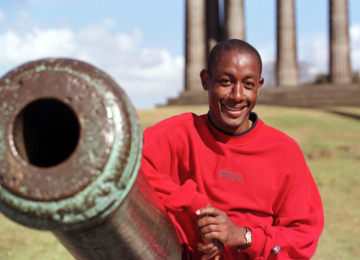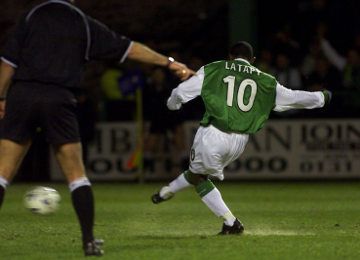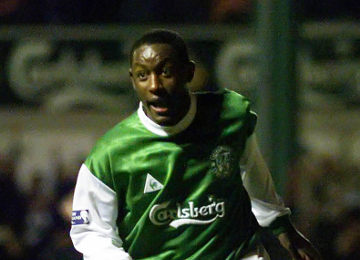On a dreich Wednesday in the capital, www.hibernianfc.co.uk rewinds the clock to remember a prodigiously skilful player who wore the green of Hibernian with distinction, Russell Latapy; next month it will be 15 years since he made his Hibs debut against Ayr United.
His association with Hibernian was brief, but the charismatic Trinidadian left a lasting impression - this is his story:
When Russell Latapy moved to Easter Road in October 1998, Hibernian manager Alex McLeish quickly realised he had produced a sizeable coup in the transfer market.
But that proved to be an understatement because he had acquired the services of a wondrous entertainer and a true match-winner.
Latapy's friend and Trinidad and Tobago team-mate, Tony Rougier had recommended him to McLeish, who invited the then 30-year-old to participate in a bounce match against Brechin.
One piece of eye-catching individualism then sparked off an exciting chapter in Hibernian's history with Latapy enchanting McLeish and the club's supporters in the process.
While few Hibernian supporters would have recognised the diminutive Trinidadian before he joined the club, he arrived at Easter Road with an impressive cv.
He began his career in his homeland, but it was not until he moved to Portugal in the early 1990s that his career began to really take off.
After a spell with Academica Coimbra, the midfielder joined Porto and was instrumental in helping the club win back-to-back Superliga titles.
Success followed him when he moved on to Boavista and he picked up winner's medals in the Cup of Portugal and Portuguese SuperCup in 1996/97.
He then moved to Scotland in 1998 and instantly became a fans' favourite with the Easter Road crowd thanks to his extraordinary talent.
 The languid lad from Port of Spain commenced a celestial sojourn in Leith with the team in green and illuminated Easter Road with moments of breathtaking skill.
The languid lad from Port of Spain commenced a celestial sojourn in Leith with the team in green and illuminated Easter Road with moments of breathtaking skill.
In terms of sheer presence and charisma, Latapy outshone a number of Hibernian's all-time greats with his enchanting repertoire of magical skills.
Swaggering down the pitch, Latapy could transform a game with a fleeting moment of artistry.
But his scintillating performances weren't simply easy on the eye because they also came with an efficient end product; a bucketload of goals.
Latapy lived up to his nickname 'Little Magician' and played a pivotal role when the team ran away with the First Division championship.
Thanks to a number of stellar performances he was duly voted First Division Player of the Year at the end of his first season in Scotland.
His most productive season, in terms of his goals-to-games ratio, came during the following campaign when he scored 12 goals to help Hibernian consolidate their place in the Scottish Premier League.
His heroic deeds earned him the right to be listed as one of Hibernian's all-time great number 10s alongside the likes of Eddie Turnbull and Alex Cropley.
Latapy shone as brightly as any star in the modern Scottish Premier League and during that season he was at his irresistible best.
Blessed with mesmeric close control, he regularly tormented defenders with a twist of the hips; selling more dummies than a persuasive mannequin salesman .
.
Latapy also had a knack of scoring spectacular goals and was clinical from the penalty spot.
His best run of goals came in the autumn when he scored five times in three games as Hibernian picked up seven points from a possible nine.
During the winter shut down that year, Hibernian travelled to the Caribbean for a mid-season training camp where his team-mates would see first-hand just how big a hero Latapy is in his homeland.
Supporters flocked to see him wherever he went and they witnessed him score in matches against a Tobago select team and a President's XI with Hibernian recording tour victories.
In second half of the season, McLeish's men would reach the Scottish Cup semi-finals thanks in no small part to two goals from Latapy against First Division Falkirk.
Latapy would score a sensational individual effort in the Scottish Cup semi-final against Aberdeen at Hampden Park.
Running half the length of the field, Latapy jinked past a sea of Dons' defenders before slotting past Jim Leighton, but sadly it didn't prove to be enough.
A colossally important player, Latapy then ascended to the loftiest pinnacle of any Hibernian folk hero when he helped to break Hearts on 22 October 2000.
Hearts manager Jim Jeffries later admitted his team were powerless to prevent Latapy from annihilating the team in maroon.
Even though Mixu Paatelainen plundered a hat-trick, Latapy was the chief architect behind Hearts destruction underneath the floodlights at Easter Road and he scored goal number six with a thunderous volley.
A laid-back character renowned for his poor timekeeping, Latapy ran into serious disciplinary difficulties which ultimately led to his departure from the club.
After two-and-a-half years in Edinburgh, Latapy and Hibernian parted ways, but he wasn't out of football for long and was quickly snapped up by Rangers manager Dick Advocaat.
Despite a promising start at Ibrox, Russell was only ever used sparingly at Rangers after McLeish succeeded Advocaat as boss.
A short stint with Dundee United followed and it appeared Latapy's career was almost over.
That was until former Hibernian team-mate John Hughes, the then manager of Falkirk, persuaded him to join the Bairns and he was able to re-ignite his career.
He may not have had the stamina to get around the park like he once did but he still possessed the flair that would prove a key ingredient of Falkirk's promotion push.
By the time Russell left the club six years later he was a Bairns legend and had been inducted into the Falkirk Hall of Fame.
He was just two games short of reaching a century of appearances for Hibernian and had scored 29 goals - the abrupt manner of his departure often prompts Easter Road regulars to ask what might have been had Latapy stayed a while longer.
Nevertheless he was a crowd-pleaser who won the affections of the Easter Road faithful with a smile on his face, Latapy was a thoroughbred footballer who deserves a glowing epitaph in the annals of Hibernian folklore.
